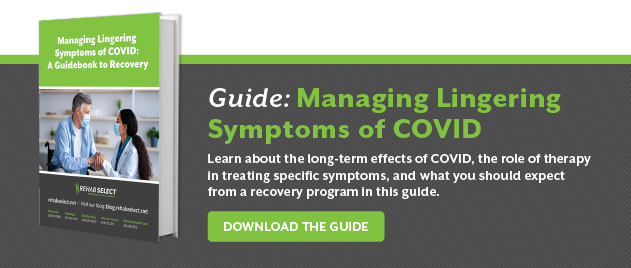
If you have contracted COVID-19 and are still suffering from symptoms for more than four weeks after the initial diagnosis, you're not alone. Many patients experience long-term COVID symptoms, and medical professionals are taking notice.
Among the many long-term health issues, COVID brain fog can be particularly challenging. Because it affects every aspect of a patient's life and the less well-defined set of symptoms can make it difficult for doctors to provide treatments, it’s wise to seek care of a rehabilitation team to combat this issue.
What Is COVID-19 Brain Fog?
Brain fog describes the feeling of having sluggish and fuzzy thinking. People may suffer from brain fog when they're sick with the flu, experiencing jet lag, or not getting enough sleep. In most cases, their cognitive function will return normal when the cause is resolved.
COVID brain fog describes the cognitive challenges suffered by patients who had COVID-19. Many of them might have recovered from the acute and life-threatening effects of the illness, yet their thinking and memory aren't back to normal.
The Causes of COVID-19 Brain Fog
Medical professionals believe that COVID brain fog is caused by damages the coronavirus does to the brain. For example, COVID can impact brain functions directly by encephalitis. Damages to other organs such as the lungs, heart, and kidneys can also lead to fatigue, impaired thinking, and loss of memory.
The long-term psychological effects of ICU stays may cause anxiety, depression, and post-traumatic stress disorder (PTSD) that can impact cognitive functions. Some researchers also believe that underlying inflammatory conditions, silent strokes, and the lack of oxygen can create long-term impacts such as COVID brain fog.
How to Alleviate COVID-19 Brain Fog with Therapy and Lifestyle Changes
COVID brain fog can be treated effectively through a multi-prong approach guided by a skilled rehabilitation team. A treatment regimen should include nutrition, lifestyle changes, and therapy to enhance cognitive functions:
1. Perform Aerobic Exercises
Aerobic exercises, such as brisk walking, running, and cycling, cause the body to release adrenalin and improve circulation. This helps deliver more blood and nutrients to the brain and enhance memory. Besides the "usual suspects," such as dancing, climbing stairs, or even doing housework or yard work, any activities that cause you to break a sweat can deliver the same benefits.
If you're still recovering from other COVID symptoms or haven't been active, you may need to start slow. For example, begin with a few minutes of movements a few times a day and work your way up to the recommended amount of 30 minutes a day, five days a week.
2. Improve Your Diet and Nutrition
What you eat can have a profound impact on your brain functions. Incorporate more "brain foods," such as salmon, olive oil, avocados, and dark leafy green vegetables, into your meals. A Mediterranean diet consisting of olive oil, fruits and vegetables, nuts and beans, and whole grains can help improve cognitive functions and memory.
You should eliminate drugs and alcohol, which are known to affect brain health. Also, cut out sugar, processed foods, MSG, artificial sweeteners (e.g., aspartames,) and trans fats from your diet because they are associated with brain fog.
3. Get More Sleep
The body and brain clear out toxins when we sleep. Researchers found that sleep deprivation disrupts our brain cells’ ability to communicate with each other, causing temporary mental lapses and affect memory. It is, therefore, important to give your body the sleep it needs. Since you're recovering from an illness, you may need more sleep than usual.
Practice good "sleep hygiene," such as following a pre-bedtime routine, creating a sleep-inducing bedroom environment, optimizing your sleep schedule, and establishing "pro-sleep" habits during the day to help you sleep longer and better at night.
4. Manage Stress and Anxiety
Going through COVID can be stressful for many patients. The mental fatigue caused by stress and anxiety can exacerbate brain fog because it's harder to think, reason, and focus when your brain is exhausted. You can relieve stress by practicing self-care, relaxing, and doing things that you enjoy.
Counseling can help you work through anxiety. Many people also find yoga, meditation, and other stress management techniques helpful. You can develop a stress management plan to help you handle common stressors and make self-care part of your daily routine.
5. Incorporate Cognitive Therapy
Cognitive therapy is a form of relatively short-term and focused psychotherapy. The action-oriented, practical, and rational approach helps patients regain the skills and independence they need to conduct their daily lives.
Some of our patients at Rehab Select have benefited from working with speech and language pathologists to help them with tasks such as recalling phone numbers. It’s important to work with a rehab team that is closely following the latest research. For instance, a UAB report found that a specific type of cognitive therapy called Constraint-Induced Therapy (CI Therapy) can help patients clear COVID brain fog.
6. Work with an Occupational Therapist
An occupational therapist can provide you with mental training tools and exercises to optimize your thinking abilities as you work through the physical, mental, and cognitive challenges caused by COVID.
Your therapist can also help you address mental health concerns that could be disrupting your everyday life. By establishing meaningful routines that support the quality of life, you can make the appropriate lifestyle adjustments to support your healing journey.
COVID-19 Recovery: You Don't Have to Go It Alone
The physical, mental, and emotional impact of COVID-19 has put tremendous pressure on patients and their loved ones. It's particularly challenging for long-haulers who struggle with persisting symptoms such as COVID brain fog.
To address these challenges, Rehab Select is partnering with the University of Alabama at Birmingham and the CODA/PTA to open dedicated COVID recovery units at all of our locations. We provide specially trained nurses and staff to oversee the care of recovering COVID patients so they can get the most appropriate therapies for lingering physical and mental issues.
Learn more about our COVID Recovery Program and schedule a tour to see how we can help.




